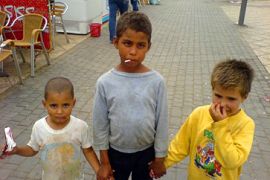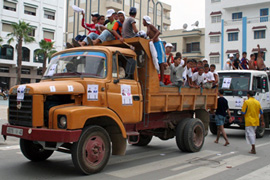Nobody’s constituency
The plight of street children does not feature in any political party’s programme.

 |
| The street children of Morocco are the human face of a long catalogue of socio-economic ills |
Moroccan political parties are racing against time to gain the confidence of voters in Friday’s parliamentary elections.
Their promises range from combating unemployment to providing health care, improving the education system to developing rural areas, and from attracting investment to creating jobs.
But none of them has cared to present a plan to take homeless children off the streets.
Street children, whose numbers are growing, are the human face of a catalogue of socio-economic ills, notably poverty, the rupture of the family unit, divorce, remarriage and irresponsible parenting.
Precarious existence
If questioned, the children invariably say they prefer life on the streets to the one they left behind.
What they do not say is that the constant search for a safe place and the bonding that develops from such a precarious existence become, over time, a source of peer pressure and exploitation.
Many of them end up suffering permanent physical and psychological harm.
 |
| For Abdel Fatah, at left, home meant neglect and mistreatment; for Omar it meant poverty |
Moroccan society may have become too accustomed to the sight of street children to consider their rehabilitation a pressing electoral issue.
But as individuals, their stories are as worthy of attention as they are poignant.
Abdel Fatah, 16, and Omar, 14, live on the streets of Mdiq.
For Abdel Fatah, what drove him to leave home were neglect and mistreatment; for Omar, it was poverty.
At first, Abdel Fatah was reluctant to revisit his unhappy childhood or unlock the mysteries of street life, but the promise of a hot meal and money made him open up.
“I went to school for only one year. I quit because I did not like it, neither did my mother. My father abandoned us when I was a child. My mother was cruel and used to blame me and my other two brothers for her misfortune. I left home and started to work in construction when I was 11 years old. But the man I used to work for was very abusive,” Abdel Fatah said.
“After working for a few months, I found myself on the street with nothing to eat, no clothes and nowhere to sleep. But I found other children out there who later became my friends. Now I am happy and free.”
Addictions
Abdel Fatah started to smoke at the age of 11, and a year later his new friends pushed him to sniff glue. He sleeps in different places every night, mostly in mosques, public gardens and in bus stations.
His mother never bothered to inquire about him, he said.
After listening to Abdel Fatah’s story, Omar decided to talk as well.
|
Plight of the street girl child |
|
Boys may be more visible as street children, but the lot of girls from poor families is no better. While boys growing up on streets are likely to become criminals and gangsters, girls are at risk of ending up as prostitutes. Tens of thousands of them work as housemaids, a job in which, according to a 2006 Human Rights Watch report, they face physical and psychological abuse in addition to economic exploitation. Non-governmental organisations estimate that about 90 per cent of single mothers in Morocco were housemaids in their childhood. |
“I am more educated than Abdel Fatah. I spent two years in school.
“As we are poor and I am the eldest of four brothers and sisters, my parents sent me to work with my uncle in a small coffee shop, where most of the clients were cannabis smokers,” he said.
“I worked for one year and I became who I am now at the age of 12. Now I spend the whole day on the street, but I do go home at night.
“I earn some money by begging that enables me to buy food. My parents are pleased because I never bother them to feed me.”
Like Abdel Fatah, Omar smokes cigarettes and sniffs glue.
Both ended their conversation with your correspondent with a pledge to give up their bad habits.
Sadly, the first thing they did as they walked away was to begin sniffing glue from polythene bags in their hands.
Distrust in adults
Abdel Fatah and Omar appeared have no faith in adults, who in their opinion regard street children like them as thieves and criminals – in short, a nuisance instead of a blot on society’s conscience.
Laarbi, who said his age was 14, agreed to talk to this correspondent but refused to have his photograph taken.
 |
| Street children are lured by food and cash to take part in election campaign rallies |
He said he came to Mdiq from the south of the country.Laarbi’s dream is to cross the Mediterranean Sea to Spain.
He works as a shoeshine boy in the hope of saving up the $2500 needed to book a place in a human-smuggling boat.
Laarbi said he has no bad habits and shares a room with four other children.
He pays up to $50 per month to a gangster for protection and shelter.
What Abdel Fatah, Omar and Laarbi have in common is that they are all busy these days. They are working for the campaigns of different election candidates in return of food or cash.
They know they are being exploited but they do not care; all that matters to them is survival.
|
Remedial programmes fall short |
|
Efforts to give Morocco’s street children the chance of a decent life are woefully insufficient given the magnitude of the phenomenon. The few programmes designed to deal with the root causes are run by voluntary and non-governmental organisations, notably Bayti (My Home) in Casablanca and Darna (Our Home) in Tangier. With their focus on remedial activities, they try to reunite at-risk children with their families. The Moroccan government has initiated a number of projects to address the issue, but its efforts are hampered by a lack of resources in terms of money and trained staff. The law stipulates two- to six-month prison sentences for beggars over the age of 18. Even so, the kingdom is believed to have up to 500,000 “professional beggars” who use children and disabled people as tools of their trade. |